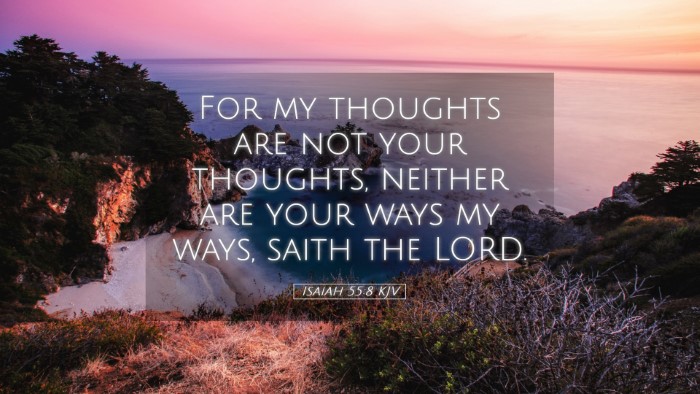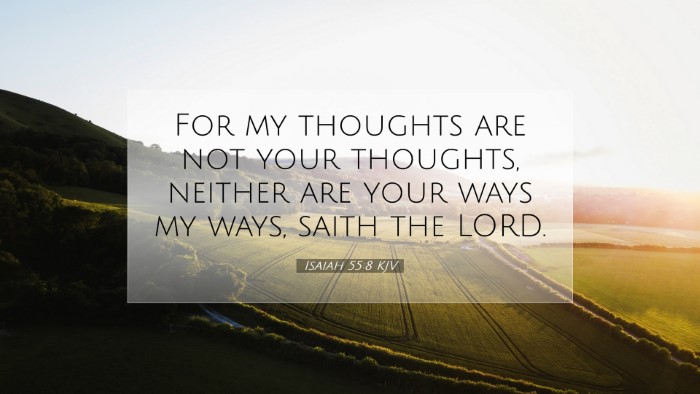Commentary on Isaiah 55:8
Verse: Isaiah 55:8 - "For my thoughts are not your thoughts, neither are your ways my ways, saith the Lord."
Introduction
This verse serves as a profound reminder of the vast chasm that exists between divine wisdom and human understanding. The prophet Isaiah, through these words, highlights the limitations of human reasoning in the face of God’s infinite wisdom. Public domain commentaries shed light on the depth and implications of this scripture, offering insights that are particularly valuable for pastors, students, theologians, and scholars.
The Nature of God's Thoughts
1. Divine vs. Human Cognition
Matthew Henry emphasizes that God's thoughts are unfathomable, transcending the human experience. Unlike human thoughts, which are often fraught with error, doubt, and limitation, God's thoughts possess infinite wisdom. His understanding encompasses all of history and creation, knitting together an elaborate tapestry that human viewers can scarcely comprehend.
2. Sovereignty and Purpose
Albert Barnes highlights that God’s thoughts encompass His sovereign will and divine purpose. He articulates that the divine plan is often inscrutable to mankind, reflecting the idea that God sees the end from the beginning. This notion serves to remind believers of their finite perspective amidst God's eternal framework.
The Contrast between Divine and Human Ways
1. Moral and Ethical Horizons
Adam Clarke comments on the practical implications of divergent ways. God's moral landscape differs greatly from humanity's often relativistic and situational ethics. God’s ways are just, holy, and righteous, unlike human ways, which frequently succumb to sin and moral ambiguity. This serves as a critical call to align one's life more closely with God’s standards.
2. The Implications of Human Perspective
Matthew Henry warns against the dangers of relying solely on human understanding. He suggests that humanity tends to be short-sighted, often fixating on immediate concerns without considering the eternal implications. This disconnect underscores the importance of seeking divine guidance in one's decisions and life pathways.
Application for Believers
1. Trusting in God’s Plan
In light of this verse, believers are encouraged to cultivate a posture of trust. Albert Barnes notes that recognizing the disparity between God's thoughts and human thoughts should lead to deeper faith. The assurance that God knows best aligns the believer’s heart toward submission and obedience, even when circumstances seem contrary to understanding.
2. Seeking Divine Wisdom
Adam Clarke emphasizes the necessity for followers of Christ to seek wisdom that comes from above. In Proverbs 3:5-6, the exhortation to trust in the Lord with all one's heart is a natural response to Isaiah 55:8. Believers are to cultivate a relationship with God through prayer and the Scriptures, seeking His will over individual understanding.
3. The Role of Faith in Understanding
Faith plays a critical role in reconciling human understanding with divine revelation. Matthew Henry illustrates that faith provides the lens through which the believer can begin to grasp God’s larger purposes, enabling them to navigate life with hope even amid confusion and struggle.
Theological Implications
1. The Nature of God’s Revelation
This verse points to a broader discourse on the nature of divine revelation. While God's essence remains mysterious, He has revealed enough of His character to foster relationship and trust. Albert Barnes underscores this, noting that God's Word serves as a light, illuminating the path amidst the shadows of human confusion.
2. The Call to Humility
The recognition that human wisdom is inadequate in the face of divine thought creates a call for humility. Adam Clarke suggests that acknowledging one’s limitations before God is a necessary step toward spiritual growth. This humility is critical in fostering a teachable spirit and a heart ready to engage with scripture.
Conclusion
In summary, Isaiah 55:8 serves as a resonant reminder of the transcendent nature of God’s thoughts and ways. For pastors, students, theologians, and scholars, the reflections drawn from public domain commentaries provide a rich tapestry of insights that motivate deeper engagement with the divine will. Recognizing the disparity between divine and human cognition can transform our approach to ministry, study, and daily living, urging us towards greater trust, pursuit of wisdom, and humility before the Almighty.


